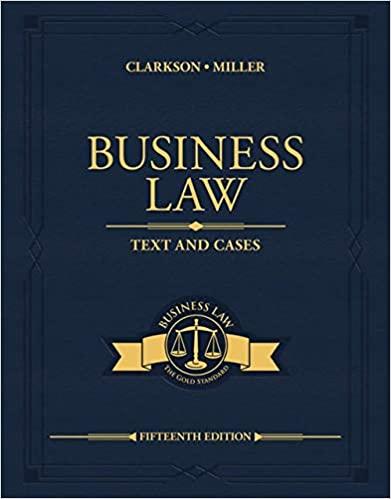Question
Title I of the Americans With Disabilities Act, 42 U.S.C. 12112(a), requires employers to provide reasonable accommodation to otherwise qualified persons with a disability to
Title I of the Americans With Disabilities Act, 42 U.S.C. 12112(a), requires employers to provide reasonable accommodation to otherwise qualified persons with a disability to enable them to work. The federal government has a similar requirement under Section 504 of the Rehabilitation Act of 1973, 29 U.S.C. 794. A "reasonable" accommodation a determination to be made on the facts by the employer on a case-by-case basis. Ultimately, the decision an employer makes could be reviewed by the Equal Employment Opportunity Commission (EEOC) (or an equivalent state agency) or a court if the employer is sued for discrimination.
DISCUSSION PROMPT:
CASE STUDY (HYPOTHETHICAL)
Jordan, a fully qualified specialized registered nurse, is deaf. Jordan relies upon an American Sign Language (ASL) interpreter to communicate with hearing individuals in the workplace. Jordan applied for a job with Carmel Receiving and Trauma Center ("CRTC"), a large medical center that, with all its hubs and subsidiaries, grosses $1.3 billion annually. Net profits are in the millions.
Jordan received a job offer, conditioned upon a health screening and clearance by CRTC's occupational health department. Jordan was in fact cleared. Jordan notified CRTC of the need for an ASL interpreter as an accommodation for Jordan's hearing impairment.
The annual salary, including benefits, for Jordan's position was approximately $75,000. Upon investigation, CRTC calculated that the annual cost to CRTC for the ASL interpreter accommodation would be an additional $100,000 annually; there was the need for a full time interpreter for Jordan, plus several situations where two ASL interpreters would be required.
In considering Jordan's request for accommodation, CRTC's hiring supervisor wrote in an email to her boss that the department's annual budget allocation could not absorb the "excessive cost of the additional personnel" of ASL qualified interpreters "for this one nurse."
Based on the cost of the accommodation, CRTC immediately determined that the additional salary and overhead for the interpreters would be an "undue hardship," making the accommodation unreasonable. Relying on the undue hardship defense, CRTC did not hire Jordan.
Did CRTC violate ADA?
DISCUSS:
1. Was CRTC within its legal rights under ADA to refuse the accommodation and thus not hire Jordan on the basis of undue hardship? In considering this case, you should review:
(a) what is considered a "reasonable" accommodation under ADA including sample accommodations listed by ADA (42 U.S.C. 12111(9) (2018)) and the EEOC (www.eeoc.gov); and
(c) the definition of "undue hardship" and standard an employer has to meet to establish "undue hardship" (42 U.S.C. 12111(10)(a) (2018)); and
(d) case law - research what the courts consider in determining if there is undue hardship justifying not providing an accommodation
2. Are there ethical considerations involved in this case beyond what is required by the "letter of the law" and if so what are they?
Please support your thoughts and conclusions with reasoned analysis and your research.
Step by Step Solution
There are 3 Steps involved in it
Step: 1

Get Instant Access to Expert-Tailored Solutions
See step-by-step solutions with expert insights and AI powered tools for academic success
Step: 2

Step: 3

Ace Your Homework with AI
Get the answers you need in no time with our AI-driven, step-by-step assistance
Get Started


